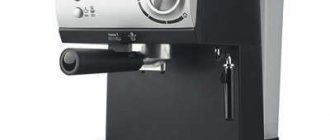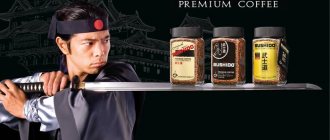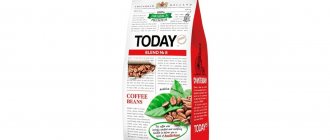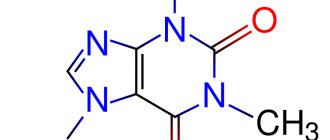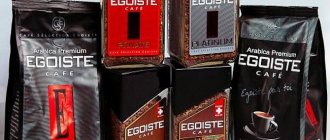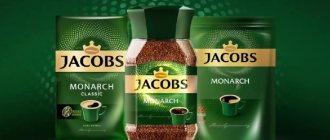Coffee trees grow and bear fruit well only in countries with a very warm climate. Famous coffee exporters in the world include Brazil, Colombia, Costa Rica and others. These states have huge tree plantations. After the collection of fruits, their drying and purification of the grains from other elements are completed, transportation in huge quantities begins to where roasting, grinding (if necessary) and packaging will take place. That is why on the shelves of shops in Europe and Russia there is a lot of coffee from Italy, Germany and other countries where trees cannot grow. And among the most famous coffee producers is Julius Meinl.
History of the Julius Meinl coffee brand
True coffee connoisseurs consider Julius Meinl one of their favorite drinks.
In the summer of 1683, the large army of the great Visar Kara Mustafa decided to surround the current capital of Austria with a blockade ring, but the Polish troops who arrived on the spot in time managed to defeat the Turkish army.
The prisoners were captured, and a bag of coffee beans was found from one of them, a young Moorish child. Subsequently, the boy prepared the Austrians a previously unfamiliar coffee drink.
The year 1862 will be remembered by coffee lovers for the revolution that took place in Viennese coffee culture. The founder was Julius Meinl I - for the first time in history, he offered customers already roasted grains. Before this, lovers of the invigorating drink purchased coffee beans and roasted them in the oven at home, which caused a deterioration in both the taste and quality of the drink.
The bright design, which is known to every coffee lover today, was invented in 1924 by Joseph Binder. He decided to make the image of that same black boy the symbol and trademark of Julius Meinl. The Moorish baby's profile has already become a symbol of quality.
Brand history
The name became the first and last name of the company's founder - his name, accordingly, was Julius Meinl. He was a merchant who operated in Austria-Hungary. In 1862, Meinl opened his first own store in Vienna. It sold not only coffee, but also tea, spices, and cocoa beans. The know-how was that the coffee was sold there, having just been roasted and therefore incredibly aromatic. This process took place in the “correct” conditions, under the control of employees, and the quality of the product turned out to be very high - it was free of foreign odors and tastes, which greatly interfered with the enjoyment of the drink. Before this, people were forced to fry green grains themselves, at home, in a regular frying pan after purchase - and it turned out badly.
It was thanks to the idea of industrial roasting that Julius Meinl quickly became incredibly famous, mainly among housewives, whom he saved from hard, unpleasant work. Mr. Meinl's business took off. In 1913, the main office and roasting shop moved to the street named after him - Julius Meinl-Gasse. This name has been preserved to this day.
Julius Meinl coffee is produced in Austria
Over time, the company became the main coffee roaster throughout the Austro-Hungarian Empire, as well as the largest importer of coffee and tea in Europe. The main store was opened in 1950 on one of the central and most fashionable streets of Vienna - Graben. There, today you can buy Austrian coffee Julius Meinl in packages or drink a cup of ready-made drink.
The company is still led by Julius Meinl, the great-great-grandson of the founder. And the famous brand is still synonymous with high-quality (although, of course, expensive) coffee. The company actively attracts attention (for example, by opening a giant coffee shop during the 2008 World Cup) and actively invests in creating innovations.
Logo
The company's trademark is a stylized image of a Moorish boy, which was created by a man named Joseph Binder in 1928. According to legend, in July 1683, the Turkish troops of Kara Mustafa, numbering 100 thousand people, kept Vienna in a blockade, but the Poles defeated the Turks. Among the prisoners was a small black boy who took grains from a bag and prepared a drink right in front of the soldiers. Before this, the Austrians did not know coffee. Later, the logo was noticeably simplified, leaving only a silhouette of the full image.
Raw materials and production Julius Meinl
This brand has been producing a quality product for more than one hundred and forty years.
The Julius Meinl company does not forget about purchasing high-quality raw materials for coffee and guarantees control of the production process. Experts take into account many factors when selecting raw materials, including the altitude of the area where the coffee tree grows, harvest time, region, and ripeness of the berries.
Coffee consumers are accustomed to high-quality drinks, and this must be met. Julius Meinl creates blends from Robusta and highland Arabica beans, which are collected on the world's best coffee plantations.
Before entering production, raw materials are carefully selected in the company's production centers located in Italy (Vicenza) and Austria (Vienna). After roasting, the grain again undergoes diagnostics using electronic equipment, with which you can check up to 1000 grains per minute.
After which the coffee is hermetically packaged, which ensures the beans pristine freshness. There is no doubt about the first-class quality of coffee, because both roasted and raw beans are the reason for endless checks and continuous tastings carried out in the company.
Brand assortment
Austrian coffee is famous for its quality, because each bean is carefully selected before entering production. All coffee varieties are developed on the basis of Arabica and Robusta, usually combined in proportions of 80% to 20%. The uniqueness of Julius Meinl is that even using the same ingredients, they manage to create varieties with different flavors, since the raw materials are supplied from different countries.
Features of Moccona coffee
The company produces the following types of coffee products:
- ground and grain;
- capsules for coffee machines;
- espresso mixtures;
- coffee blends.
Julius Meinl does not produce instant coffee, as it considers it a surrogate. It is not for nothing that the brand is valued precisely for its high quality and unusually beautiful blends.
Product line of coffee beans
The drink, with the image of a boy in a fez, has become very popular all over the world.
Julius Maine products are divided into 3 lines:
- ground coffee;
- coffee beans;
- coffee presented in large packages (HoReCa series - especially for restaurants and hotels).
In fact, there are much more series, since the indicated lines include single-origin varieties, a series created for preparation in a French press, capsule and others. Ground coffee comes in the same variations as beans. Therefore, what kind of coffee to buy - made from ground or whole grains - depends only on the buyer.
Ground coffee from Julius Meinl
- Viennese Breakfast is a classic ground coffee drink, ideal for invigorating your morning. It has a rich taste and deep aroma that energizes you throughout the day. It goes well with milk and cream, so it is suitable for making Viennese coffee.
- President is an exclusive blend of Brazilian and Colombian Arabica beans. Melange turns out to be very strong, tart with a high caffeine content. Good for making Americano.
- “Viennese Breakfast Delight” is similar in taste to its classic counterpart, but is stronger and richer in aroma.
- Robusta lovers will appreciate Vienna Melange. The coffee has a medium roast and perfectly combines notes of tartness and sourness.
- Grand Espresso, on the contrary, will appeal to connoisseurs of pure Arabica. The drink has low acidity and has a rich, bright aroma. Perfect for making espresso at home.
Wiener Mokka coffee
Wiener Mokka coffee
Bean coffee, the “homeland” of which is Central Brazil. Varieties of this “coffee” are known for their lack of bitterness and softness; the beans have a dark roast color. Many people like the drink because of its chocolate flavor, reminiscent of hazelnuts, the smell of dry fruits and freshly baked pastries.
Espresso Bar classico
Espresso Bar classico
This espresso representative of the HoReCa series can be described as a soft, velvety and invigorating drink with notes of roasted cashews. Its golden foam that forms on the surface has already become a “tradition,” and its delicate aroma makes it impossible to refuse the drink.
Interview
Julius Meinl V is a representative of the oldest Austrian-Jewish business family. His paternal ancestor founded the Julius Meinl company in 1862, which specialized in the import, processing and trade of coffee, and subsequently became one of the largest retail chains in Austria-Hungary and throughout Eastern Europe. After the Nazis came to power in Austria, the family business was confiscated, part of the family died in the Holocaust, the other part was able to escape in Great Britain. After World War II, the Meinls returned to Austria, secured the return of some of their assets and continued to build the family business. Now Julius Meinl is a large international financial holding with assets in Central and Eastern Europe, Russia and other countries of the post-Soviet space. In an exclusive interview with Jewish.ru, which also became his first interview with a Russian-language media outlet, Austrian banker and industrialist Julius Meinl V explained how the Second World War and the Holocaust of European Jewry affected his family, how his grandfather helped identify Nazi criminals and their collaborators, and why The British and other Allies chose to ignore the horrors of the Holocaust.
For Austrian Jews, the real problems began with the Anschluss - the annexation of Austria into Nazi Germany. Your family had a large business and serious positions in Austrian society. How quickly did the family start having problems under Nazi rule? – Immediately. My maternal grandfather was the third-generation owner of the largest and most sophisticated store in the Austro-Hungarian Empire, the Gerngross department store in Vienna. It's kind of like Harrods in London. And the first attack of the Nazis was on our Viennese store - they threw a grenade with tear gas through the window. Grandfather thought that everything would pass. “Although it has become difficult, we have experienced difficult times more than once. There’s no point in hanging your nose – we are proud and strong,” he thought. How wrong he was! Of the seven brothers and sisters in my mother’s family, four died in the Holocaust: in Maly Trostenets near Minsk, in Poland, in Treblinka, one of the sisters, realizing the hopelessness of the situation, simply committed suicide during the deportation. Grandfather and grandmother were able to leave for Uruguay. And of course, everything was taken away from them.
Did the paternal side of the family suffer as much? Your grandfather Julius Meinl III was an Austrian... – On your father’s side, it’s a slightly different story. When the Anschluss happened, my grandparents were in Paris, but their children remained in Vienna, so I had to return. They were detained at the border for a day - they were stripped and searched, but they were allowed through. It quickly became clear to them that Austria was not the place to stay: many restrictions appeared. My grandmother was represented by a famous lawyer. So, a month and a half after returning, she received a letter that said: “Even though we are friends of your family, we can no longer represent you, because we are prohibited from representing Jews.” And so it was in everything: for example, doctors were not allowed to treat them. And they quickly decided to leave. First - to Yugoslavia, and from there - to Great Britain.
What happened to your family business after the Anschluss and emigration? – The Gerngross department store, owned by my mother’s family, was, as the Nazis called it, “Aryanized.” In our case, it was transferred to a German, who took over control and operated the facility. Julius Meinl, a food retail company owned by his father's family, was the largest in its field in continental Europe before the war: 1,000 stores and 65 factories in all the countries formed from the ruins of Austria-Hungary. After the Anschluss, the company was transferred to the National Socialist Youth Movement Trust. A board of directors was formed from members of the NSDAP. We were lucky, one might say, because if the company had become German property, it would have been nationalized by the Austrian government after the war. Small businesses were directly “Aryanized,” while large ones were usually transferred to the control of banks and sold. It is very interesting and at the same time scary to read the newspapers of that time with announcements of expropriation. The language in which they are written is identical to that used in official papers in Austria today. Only instead of the signature “Heil Hitler” there is the signature of some modern minister. Some laws have changed since then, but the legal system remains. It turns out that only the interpretation of the laws is important: then they were interpreted in accordance with the program of the Nazi Party - that’s all. This shows how fragile the world is and is not immune from such things - if the “wrong” people and political forces come to power.
Why did the Meinls decide to return to Austria after the end of the war, rather than staying in Great Britain, where by that time they had already received citizenship? – Don’t forget that the families of my grandfather and grandmother owned very serious companies. And the father, Julius Meinl IV, felt a duty to continue the work that his great-grandfather had founded. When the horrors of the Holocaust became known to the Allied governments, they chose to largely ignore them. What I mean is that they did not bomb the train stations and other infrastructure through which hundreds of thousands of Jews were transported to the death camps. Perhaps there were not enough resources, and there was no final clarity about what exactly was happening there. On the other hand, at the end of the war there was an episode with one famous photographer - she entered the Bergen Belsen concentration camp with British troops and photographed what she saw. This woman was friends with my parents, who were still living in England at that time. And she, returning from the continent, put these photographs on their dining table in London. My grandparents couldn't believe what they saw. And the fact that the British government then decided not to inform the general public about the horrors of Nazism. This was at the very end of the war, and the British were hedging their bets in case unconditional German surrender was impossible. They wanted to leave room for peace negotiations. Because if information about the horrors of the Holocaust were made public, such negotiations would not receive public support.
And how did Austria accept the grandparents? Were you able to return the selected assets? – Yes. The return process took several years and continued until 1949–1950. And yet we lost two-thirds of Julius Meinl's business - everything that was in Hungary, Poland, Romania, Yugoslavia, Czechoslovakia, which became socialist. So this was an “indirect effect” of Hitler’s policies. By the way, it was possible to return the Gerngross department store. But it was quickly sold to a large Swiss company. This is what concerns the material side, but there is another aspect. They returned to a country where people were deeply involved in the persecution of Jews for many years, even decades. In Austria, it was mainly Austrians, not Germans, who were involved in the Holocaust. So it wasn't easy to come back while those responsible - both participants and bystanders - were still around. It was difficult, you didn’t know who was your friend and who was your enemy. “They went to London or Montevideo and did not experience the horrors of war. Oh, these Jews, again they did everything well for themselves.” But, if the father’s or mother’s families had remained, they would have been slaughtered. This is a complete perversion of logic, but such an attitude existed. Moreover, from the side of people who supported Nazi ideology, and after the war they said that Austria itself was a victim of occupation, that the Austrians were the first victims of Nazism, and the Germans were to blame for everything that happened to the Jews.
After the war, your grandfather Julius Meinl III participated in the work of the Allied commission and helped them identify Nazi sympathizers in the Austrian business community... – Yes, that’s right. Several years ago we gained access to British Colonial Office records and discovered that it had named certain individuals who were Nazi sympathizers before and during the war. They participated in the persecution of the Jews, and it was necessary to remove them from social and economic life. And he did it.
You have been involved in business all your life and have never been a public person, but in 2014 you entered the public Jewish sphere and headed the Euro-Asian Jewish Congress. Why did you make this decision? – From a certain age you begin to think about what you have done for society. I see the rise of anti-Semitism in Europe. Not since World War II have Jews experienced such hardship on the European continent. Anti-Semitism takes many forms, from ordinary prejudice to criticism of Israel and rampant conspiracy theories that Jews rule the world. And I decided that the moment to act had come, no one would be able to push us to the sidelines again. It is possible to achieve certain successes. After the shooting in Belgium at the Jewish Museum, we, as representatives of the World Jewish Congress, organized a meeting with members of the government - the prime minister, the head of the Ministry of Internal Affairs, the ministers of justice and foreign affairs. We declared the need for physical protection of Jewish objects, and at the expense of the state. The decision was made right at the meeting and implemented within a week. If there was delay, the situation would have worsened significantly.
In modern France, Jewish sites are like guarded fortresses. Do you think that this is the future of Jews in Europe: to live in ghettos, where they will be protected from attacks by Islamic extremists and the far right by heavily armed police and military personnel? - True points. There are heavily armed guards everywhere. But I’m still not ready to give up my position yet. I think we must fight to maintain our presence in continental Europe. We have lived in the European space for centuries, received a lot from Europe, received opportunities, but also gave a lot to the continent. We are seeking support from European governments. The German chancellor says anti-Semitism and racism deserve zero tolerance. Although, you are right, many are now wondering whether there is a future for Jews in Europe.
Maybe it’s just time to equip new centers and develop communities, for example, in Russia and other post-Soviet republics? – This is not a bad idea. I would even say innovative. The Russian government could well enter the international market with such a proposal. Jews are part of various political and business communities, and we must do what we can to reconnect Europe with Russia.
Italian crema
Julius Meinl Italiano
Another newcomer from the HoReCa series. It is recommended to lovers of classic crema coffee and for good reason - coffee lovers note that this drink is one of the best traditional coffees they have ever tried. It is fried according to a special recipe at an Italian factory in Vicenza. In a balanced and delicate coffee you can feel the taste of roasted hazelnuts.
Julius Meinl seems to have been specially created by order of connoisseurs of the best coffee varieties who know how to enjoy the versatility of tastes and aromas.
Production and raw materials used
At the moment, there are two main production facilities. One is in Vienna, the other is in the small city of Vicenza, Italy.
Premium quality Arabica and Robusta are used. Varieties are different. The company cooperates with many suppliers from all over the world.
Coupled with an automated process of checking, selecting and roasting coffee beans, all raw materials undergo manual quality control. Products under the company's brand are supplied in sealed packaging, which allows you to better preserve the quality and taste of coffee (see: Is it possible to drink expired coffee?).
How to avoid counterfeits and not buy bad ground coffee beans
A special feature of coffee from the Austrian brand Julius Meinl is the special roasting of the beans.
Unfortunately, cases of Julius Meinl counterfeiting are not uncommon on the Russian market. In order to distinguish genuine coffee from counterfeit it is recommended:
- pay attention to the smell of the drink; its absence may indicate that it is made from roasted acorns, rye grains or barley, which has nothing to do with the production of real coffee;
- conduct a home experiment by dropping the grains into a glass of cool water; then mix and “decipher” the result obtained - the grains of the counterfeit drink will form a sediment at the bottom, while the grains of the natural drink will color the water and swell a little;
- You can easily distinguish chicory from natural ground coffee by adding purchased powder to water. Brown-colored water, which has acquired a bitter taste, indicates that the product is still chicory.
There are other ways to distinguish real coffee from fake coffee, but the above are among the most popular.
Everyone who considers themselves a coffee lover must try Julius Meinl. A truly wide product range allows you to discover something special and begin a journey into the impressive and inspiring world of the Viennese drink. Also check out the products of the brands: Dallmeier, Lavazza, Mehmet Efendi, Jacobs Monarch and Davidoff Coffee in our articles.
It is the roasting of the beans that makes the coffee taste unique.
Where to buy Julius Meinl coffee
In order to purchase Viennese Julius Meinl coffee, it is not at all necessary to fly to the capital of Austria. You can buy this wonderful product (as well as other items produced under the famous brand) in our country both in large hypermarkets (in particular, in Metro) and in relatively modest-sized “specialty” stores that deal only with tea and coffee and related products. It is possible to place an order on the Internet, pay for it and receive the purchase in a convenient way chosen from those offered. You can also buy Viennese Breakfast Julius Meinl coffee in small supermarkets and convenience stores and even in markets.

